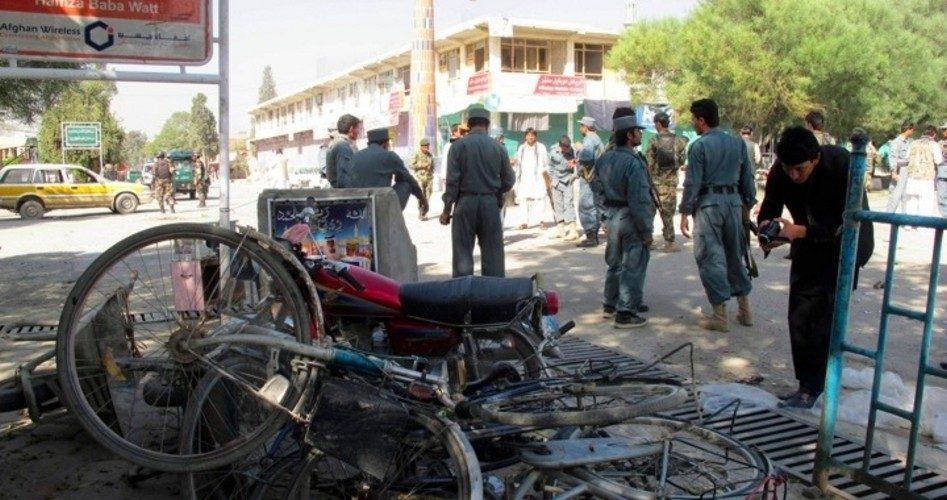
A suicide bomber on foot attacked a joint patrol of coalition and Afghan forces in the crowded center Khost in eastern Afghanistan Monday, killing three international service members and 16 Afghan police officers and civilians, according to witnesses and hospital officials. The Taliban claimed responsibility for the attack.
“A foreign and Afghan force joint convoy was targeted this morning around 9 a.m. in the vicinity of the Khost governor’s office, while the soldiers were dismounted in the area,” the Taliban said in a statement to the news media. “The attack was carried out with a suicide vest worn by one of our hero mujahid, named Shoiab Kunduzi.”
It was the fourth suicide bombing in Khost Province in the last five months and the third in Khost City, the provincial capital, the New York Times reported. Others included an attack near the gates of Camp Salerno, the major American base in the area located about five miles from the provincial capital. A suicide attack was also made at a military checkpoint in the city.
Monday morning’s attack came in broad daylight in a busy section of the city’s shopping district. “A big ball of gray smoke went into the air,” one shopkeeper told the Times. “People in the bazaar started running away from the blast site. We all hurriedly closed our shops and ran away.” Another shopkeeper said he was knocked unconscious by the blast. When he came to, he said, “I found myself lying on the ground, and I was bleeding. I looked at the street, and I saw bodies everywhere, American, police and civilians.”
The frequent recurrence of the attacks suggests the area is heavily infiltrated by the Taliban, despite — or perhaps because of — the nearby presence of a large American army base. The latest attack, along with the number of insider attacks by Afghan army and police personnel on the Western forces training and patrolling with them, highlights the difficulties involved in trying to create a reasonably safe and secure Afghanistan by the time U.S. and its coalition partners have withdrawn their combat units from the country at the end of 2014. Taliban successes in disrupting joint coalition and Afghan operations also reduce the likelihood that the insurgents will be willing to negotiate an end to the war before then.
“I don’t see it happening in the next couple years,” a senior coalition officer told the Times, speaking on condition of anonymity. “It’s a very resilient enemy, and I’m not going to tell you it’s not,” he said. “It will be a constant battle, and it will be for years.”
The Taliban broke off negotiations with the United States in March after riots had followed the burning of copies of the Koran at a U.S. military base and a U.S. soldier went on a shooting rampage, killing 16 civilians in a village in Kandahar Province in southern Afghanistan. Afghan President Hamid Karzai at that time called for the nation’s security to be turned over from NATO to the Afghan government in 2013 instead of the scheduled 2014 transition. The U.S. and its coalition allies have remained committed to the 2014 deadline, however.
Some Republicans have criticized President Obama for announcing the 2014 deadline, arguing that it gives the Taliban reason to refuse negotiation in the hope of gaining a better outcome when battling a government no longer backed by Western forces. Obama’s Republican opponent, Mitt Romney, has said he agrees with the 2014 withdrawal date, but has criticized the recent withdrawal of the troops added to the war effort by the U.S. president in the “surge” of 2009. The withdrawal of those forces leaves the U.S. with 68,000 troops in Afghanistan, along with 40,000 troops from other nations in the counterinsurgency coalition.
In this election year the American public might be no longer willing to accept an indefinite commitment to the continuation of an 11-year war that is the longest in American history. Resolutions for a faster withdrawal from the conflict have failed to gain passage in Congress. Congress can, however, stop appropriating money for military operations in Afghanistan, a course recommended by Rep. Ron Paul of Texas. Paul opposed the war efforts in Iraq and Afghanistan in his unsuccessful quests for the Republican presidential nomination in 2008 and again this year. Addressing the House in July of this year, Paul spoke of the “very, very long war” in Afghanistan.
“Nobody knows when it’s going to end. There’s always a pretense, a thought, you know, [that] tomorrow’s going to be a better day,” he said. Paul, who served in the Air Force during the Vietnam War in the 1960s, recalled hearing back then that peace was often said to be “just around the turn.”
“And here we are appropriating more money to continue this war” in Afghanistan, Paul said.
Photo of Afghan police securing site of suicide bombing in Khost, Afghanistan, Oct. 1, 2012: AP Images



